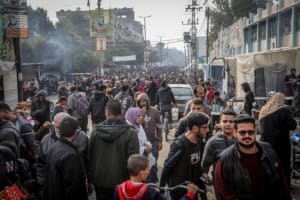WATCH: The future of Gaza: Israel discusses post-Hamas governance - ALL ISRAEL Debates
In this installment of ALL ISRAEL Debates, as the conflict with Hamas continues, Israeli society is deeply engaged in a debate regarding how the Gaza Strip should be governed "the day after" the war. Join us as we delve into these differing perspectives and the challenges ahead.
Welcome to ALL ISRAEL Debates, where we reveal differing opinions here in Israel. As the conflict between Israel and Hamas persists, a parallel discussion is unfolding within Israeli society about the future of Gaza once the fighting subsides.
The central question on many minds is, how should Gaza be governed in the aftermath of this war? While opinions vary greatly across the political spectrum, there is a unified conviction that Hamas must not be allowed to claim victory or benefit politically from the conflict.
One perspective held by some on the right is that Israel must deal a decisive blow to Hamas, and then maintain an open-ended military presence in Gaza to prevent the group's resurgence. Prime Minister Benjamin Netanyahu is a strong proponent of this view. He stated, "We are committed to dismantling Hamas's terror infrastructure to ensure long-term peace and security for Israel. We will not allow a return to the status quo where Hamas can launch attacks at will.
On the left, there are those who argue that the Palestinian Authority, led by Mahmoud Abbas, must be empowered to retake control of Gaza, as stipulated in past agreements. Ultra-left parties, like Meretz, see the PA (the Palestinian Authority) as the legitimate representative of the Palestinian people and a potential partner in peace. For example, Nitzan Horowitz and Meretz recently commented, "The only viable path forward is to strengthen the Palestinian Authority. They are the legitimate representatives of the Palestinian people and our partners in peace."
However, given the fraught history between Hamas and the PA, including the 2007 Gaza takeover, implementation of this would be extremely challenging. Yossi Alpher, a Middle Eastern analyst and former Mossad official, noted: "Reviving the PA's role in Gaza is crucial for long-term peace prospects, but it would require significant international support and Palestinian reconciliation."
Another proposal involves leveraging the traditional clan, or hamula, structures within Gaza to establish a new governance model. Dr. Kobi Michael, a senior research official at the Institute for National Security Studies (INSS), says the system is deeply rooted in Palestinian society. Empowering local clans could create a decentralized governance model that is more resilient and less prone to the kind of power struggles we've seen between Hamas and the PA."
Proponents suggest that empowering local leaders who have the trust and loyalty of their communities might be more effective in maintaining stability and order. However, a significant challenge lies in the opposition from groups like Hamas and other Muslim extremists who would object to any governing body in Gaza that abandons animosity towards Israel. They will most likely resort to violent means to suppress such initiatives, creating obstacles to implementing this proposed governance model.
Some propose an international coalition, perhaps led by Egypt or other Arab states like Saudi Arabia, to stabilize Gaza and create conditions for rehabilitation. Proponents point to the 1995 Dayton Agreement that ended the Bosnian War as a potential model.
Former Defense Minister Moshe Yaalon suggested "an international presence, with Arab states taking the lead could provide the necessary stability and help to rebuild Gaza. While attractive in theory, few countries seem eager to take this responsibility for an impoverished, war torn land.
Shlomo Brom from the INSS remarked, "International involvement is essential, but it's unlikely that Arab states will commit to such a challenging and risky endeavor without significant incentives."
Many experts caution that it's premature to contemplate detailed post Hamas arrangements while the group remains undefeated on the battlefield. They argue that unrealistic thinking about "the day after" distracts from the unfinished business of dismantling Hamas militarily to restore deterrence. According to this view, which is popular among security professionals, the first order of business must be to achieve a clear battlefield victory.
Former IDF Chief of Staff Aviv Kochavi emphasized, "Our immediate goal is to dismantle Hamas' military capabilities. Only then can we discuss the future governance of Gaza."
The debate about Gaza's future governance is complex and contentious, with no clear consensus submerging thus far. The only certainty at this point is the profound uncertainty about what comes next. As the conflict grinds on with no end in sight, this discussion will only grow and intensify within Israeli society.
While Israelis may disagree on the specifics of how to move forward, they are united in their determination to prevent Hamas from claiming victory or reaping any political benefit from the war. As the path to a stable and peaceful future for Gaza remains unclear, the search for a solution continues.
We must remember that we serve a God who's not surprised by the unfolding events and fights on behalf of Israel. He knows what is to come in "the day after," even if we do not.
Thank you for watching ALL ISRAEL Debates.
For more insights on the unfolding news and stories in Israel, please visit allisrael.com.

The All Israel News Staff is a team of journalists in Israel.
You might also like to read this:













